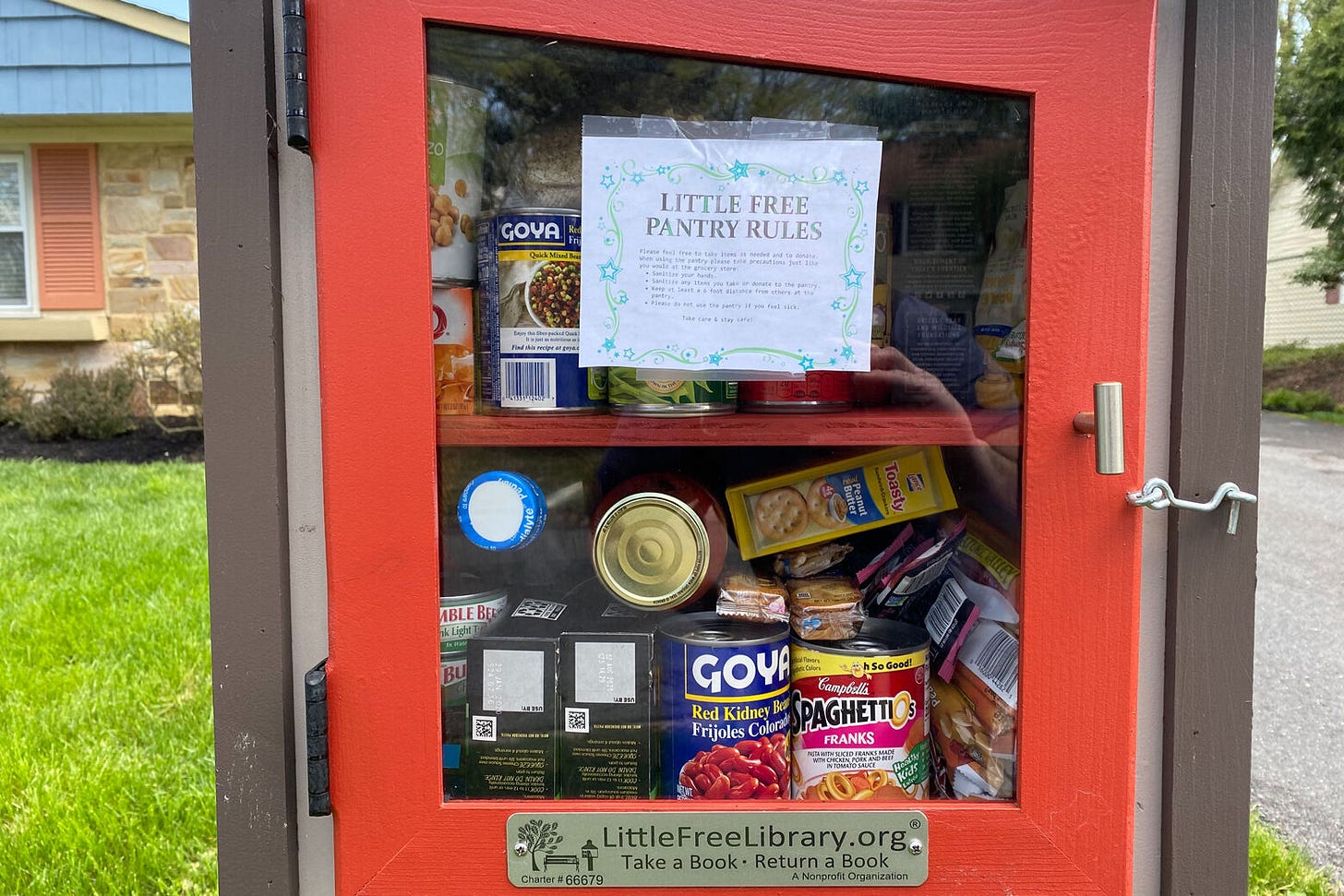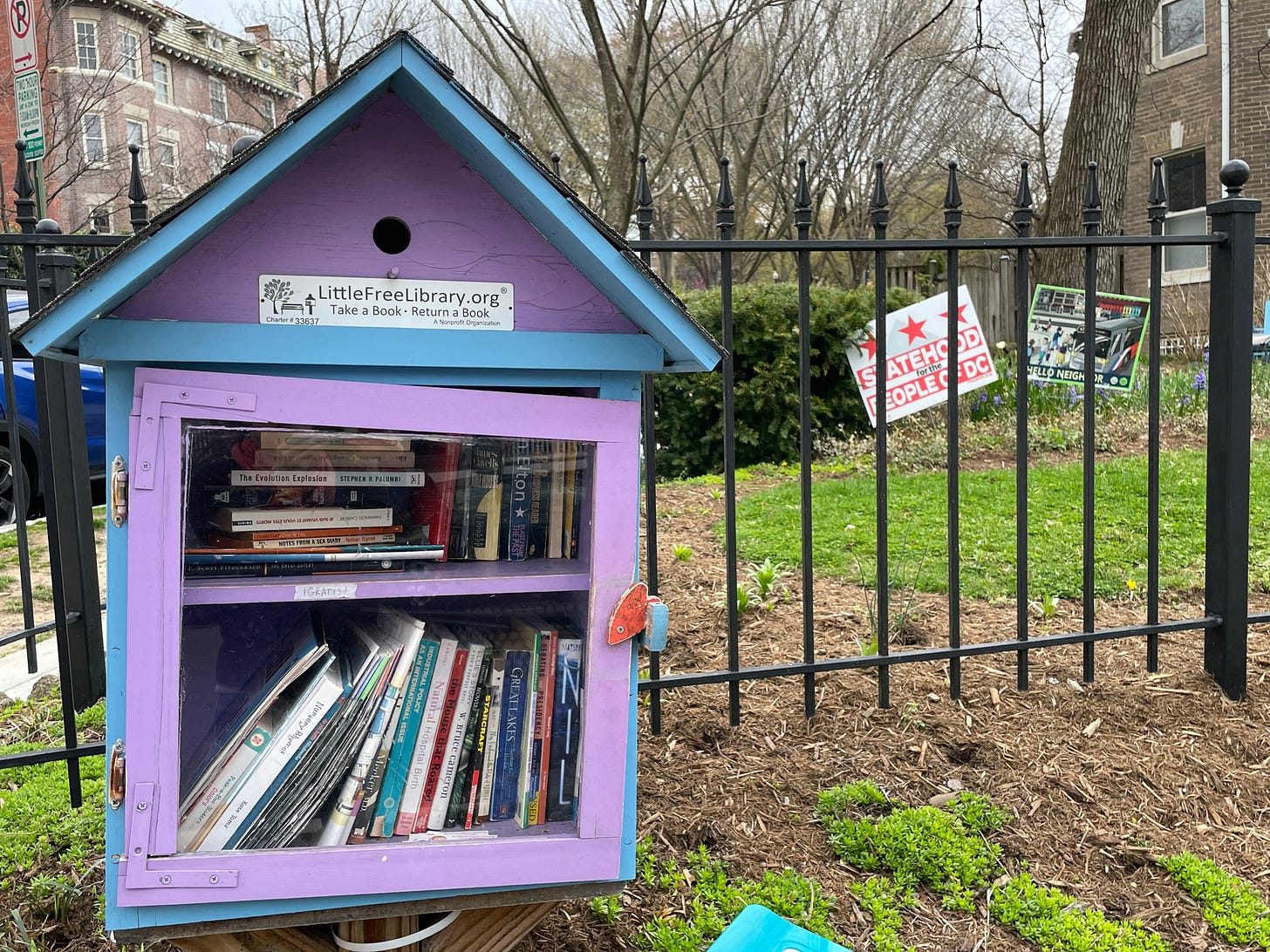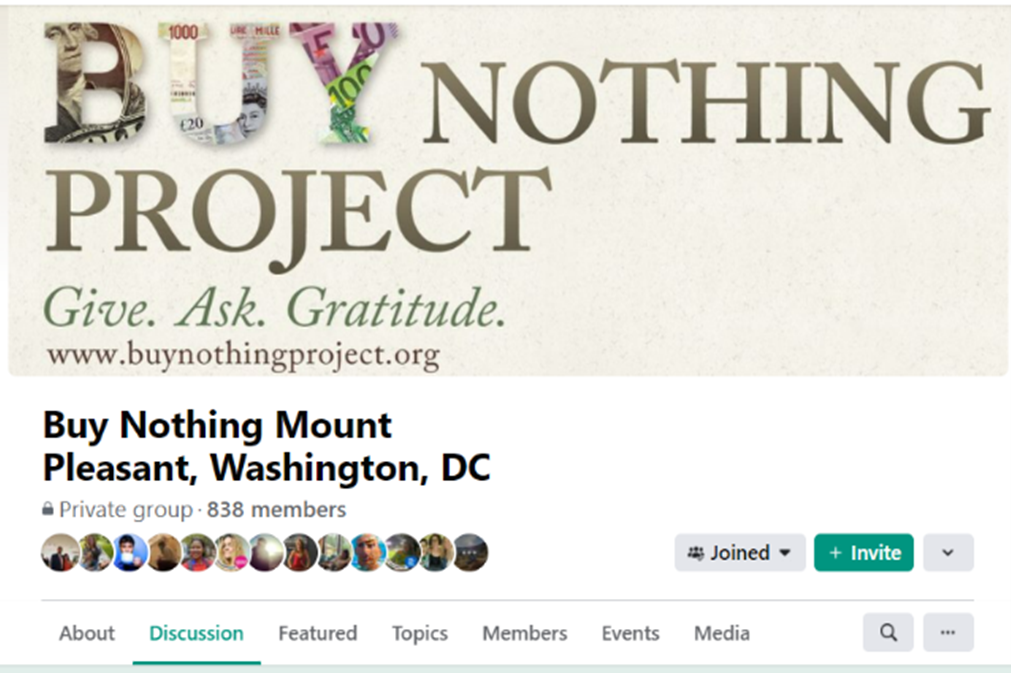Buy nothing. Read everything
I love my neighborhood's cashless economy.
It won’t surprise you to learn that I live in a blue neighborhood. My section of Washington, DC, called Mt. Pleasant, just east of the National Zoo, may have the highest concentration of returned Peace Corps volunteers of any place in the country. (I don’t have data, but I’ve heard that claim, and it seems like half the people I know here were in Peace Corps, as I was.) In 2020, Mt. Pleasant voters cast 93% of their votes for Biden, 4% for Trump. Yard signs proclaim “Hello Neighbor, Hola Vecino,” “Black Lives Matter,” and “Statehood for the People of DC.”
I could say much more about the history of this quirky (albeit gentrifying) urban enclave and the changes I’ve seen over the years. But I want to tell you about just one expression of its ethos: its robust cashless economy of giving, lending, borrowing, and requesting everything from books to furniture to pizza (“less one slice … didn’t realize it was going to be filled with meat toppings. Not my thing. Still hot!”). This continuous circulation of mostly used goods takes place through two main vehicles: the Buy Nothing group and the Little Free Libraries. Both have become a larger part of my life here than I would have imagined.
What does this have to do with women’s third age? As we begin downsizing, we realize – at least I do – that much of the clutter consists of things we bought because we briefly needed or wanted them at one point in time. Decades later, they’re still here, uselessly taking up space. Why did we acquire this stuff? Didn’t we realize how it would pile up? Did we need every item? If so, did we need to buy it? Why didn’t we find one with life left in it that someone else was ready to pass along? Or better yet, borrow it, use it, and return it?
We didn’t because that was not how things were done. I was a child in the 1950s, and I remember shopping expeditions with my dad to the local Ann & Hope. A Rhode Island chain, a precursor of today’s big-box stores like Target and Walmart, Ann & Hope was a marvel of consumer choice, bursting with items, all cheap, all useful! Dad loved the Ann & Hope. He’d tell my mom that we needed a new coffeepot, or whatever, and come back hours later with an armload of purchases. Of course our family exchanged things with neighbors too: a cup of sugar, a bag of outgrown children’s clothes. But this sharing wasn’t organized, and the circle of people involved was small.
Today, the Mt. Pleasant Buy Nothing group has 1,500 members who post dozens of items a day to the group’s Facebook page. If you need something, you can request it. If you want to get rid of something, it’ll likely find a taker. Like other Buy Nothing groups across the country, ours has unwritten conventions. After you post an item and someone else signals interest, the two of you make arrangements privately via Facebook message. In this covid age, contactless porch pickup is the norm.
Among the items I’ve offloaded: a vintage boombox with a Weavers tape stuck in it, a battery backup device that our ancient wiring couldn’t support, Christmas wrapping paper, a ceramic loaf pan with a Currier & Ives design, a paper towel holder, a picture frame, office storage drawers, an almost-full value-size bag of cherry cough drops, a box of herbal teabags, and four packets of powdered milk with a sell-by date of 2019 (this last in response to a request). I also loaned out a pair of crutches. And we haven’t even started on the furniture yet.
The Buy Nothing groups aren’t limited to Mt. Pleasant, and they aren’t even a new idea – just a tech-enabled, amped-up version of the traditional neighborly exchange or the more recent custom of piling unwanted goods on the curb for passersby to sift through. Yet they have become, nonetheless, something more. On our Buy Nothing Facebook page, a community of sorts flourishes, bringing people together around values of buying less, sharing more, and stanching the flow of junk into the global waste stream.
The same ethic animates the Little Free Libraries, and indeed all libraries. And here Mt. Pleasant is doubly blessed. We have a wonderful public library, housed in a stately Italian Renaissance building built in 1925 and renovated with an environmentally friendly design. Bill and I walk there at least weekly to check out books. But we also have, in a neighborhood of perhaps 30 blocks, almost as many Little Free Libraries. There are more than 100,000 of these book-sharing boxes around the country, according to the nonprofit organization that promotes them, but I’d guess Mt. Pleasant has an unusual number. Placed by residents in their own front yards, they invite walkers to take a book or leave a book, or several – no card required, no questions asked.
In their ease of access, small scale, and serendipitous selection, the tiny libraries complement rather than duplicate what the public library has to offer. They contain an astonishing variety of books. In Mt. Pleasant, a highly educated neighborhood with an internationalist bent, the titles range from political tomes to Nordic mysteries to children’s books, often in languages other than English. Turnover is rapid, and new books are interspersed among the well-worn ones. You never know what you’ll find, and that’s the joy. The public library system, to its credit, spends its budget wisely. It has librarians who curate the collection, remove outdated volumes, and purchase new books most likely to have broad appeal. All good – but sometimes you want to stumble on something unexpected, something odd and nichey and maybe out of date, but new and fascinating to you.

The Little Free Libraries build community in their casualness. If your neighborhood has them, there are no barriers to access. You don’t need a car; they’re on sidewalks at eye level. Nor do you need to show proof of residency and sign up for a library card. And of course there are no late fees, in fact no expectation that you will return a book after reading it, though we often do. And while the public libraries accept donated books for resale, that process is impersonal. When I leave a book at a Little Free Library and later notice it’s gone, then I know: someone is reading my book.
The Buy Nothing group and Little Free Libraries will support our downsizing in the coming months. Of course, we also donate items to charities that can use them. But nothing quite matches the up-close, personal experience of informal neighborhood exchange. It’s heartening that a majority of Buy Nothing’s members seem to be millennials, many with children, furnishing their growing households in a less wasteful way. Maybe they’ve learned from boomer mistakes? Maybe they’ll reach their third age with just what they need and nothing more.
For more on Mt. Pleasant, see The Mount Pleasant Miracle, which ran in the Washington Post Magazine last year. While the article captures the neighborhood spirit, it’s also misleading in some ways. Contrary to the subtitle, Mt. Pleasant isn’t “resisting gentrification.” That process, which has been accelerating for two decades, is far advanced. At best, the neighborhood is resisting some of the cultural changes that often accompany gentrification, continuing to prize diversity even as soaring home prices erode the very diversity that residents value.




I am the real enthusiast in the house for the Little Free Libraries. Last year, from July through September, I kept track of the ones I picked up, some to read and some only to note before returning to another Little Free Library later. I have an affiliate account with bookshop(dot)org for AfricaFocus Bulletin, and during that time I found 56 that are still in print and for sale there, of which I read 13 during that period, mostly mystery novels. You can see them in this list at https://bookshop.org/lists/books-found-serendipitously-in-little-free-libraries-in-mount-pleasant-washington-dc-july-september-2021/ No, the photos are not the ones I picked up, but new copies available for purchase from this startup rival to Amazon that sends its "profits" to independent. bookstores around the USA. But in fact almost a third of the ones I pick up in general are actually new or used but look new. P.S. I get 10% of the list price as an affilitate. Not a huge money earner (several hundred dollars over roughly a year and a half). But I get the pleasure of sharing recommendations for books to friends!
Hi Cathy, I enjoyed your post about Buy Nothing and the Little Library. We have several Little Libraries around the town where I live, and they're always full. I've used the local Buy Nothing countless times to transfer everything from a collection of random glasses (hot item!) to a snowblower. It's wonderful to know these things are benefiting someone else nearby. I've also put things on the sidewalk in front of my house with a "Free" sign, for people who are out walking their dogs or jogging. It feels alienating to drive up to a charity dumpster and drop my things off there. One time I drove half an hour to get to a Salvation Army drop-off, and was confronted with about a dozen dumpsters; it just didn't feel right. And I never went back. Lately, I've been giving clothing and household goods to Big Brother Big Sister. They have online appointments and bring a big truck to pick things up. At least there's a human receiving them! Downsizing is hard work!